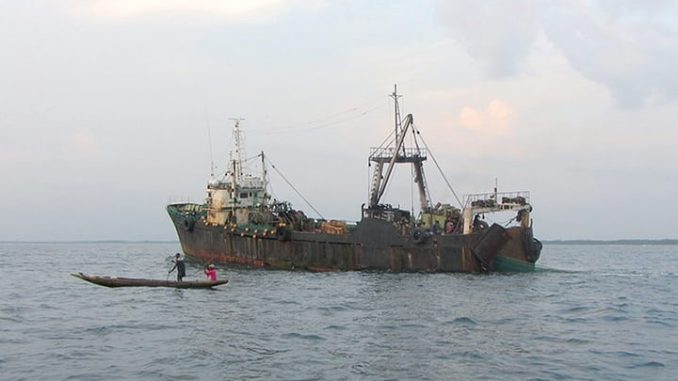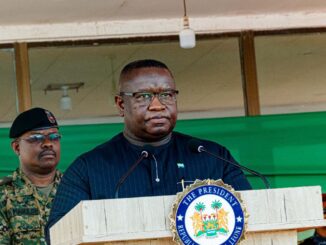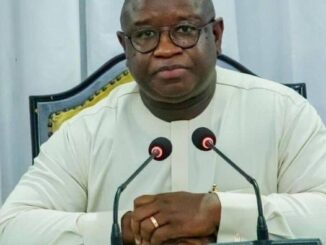
By Amadu Lamrana Bah
IUU fishing is depriving Sierra Leone of millions of dollars and affecting livelihood of fishmongers
Annually, Sierra Leone is losing an estimated US$ 50 million to illegal, unreported and unregulated fishing.
This, according to Sierra Leone’s newly-elected President Julius Maada Bio, is one of the critical challenges in the fisheries sector coupled with limited accessibility to the international market.
President Bio, who was addressing the 5th Parliament of Sierra Leone during the State Opening, said one of the key objectives of his ‘New Direction’ administration is to create a profitable fisheries industry that will contribute significantly to socio-economic development through sustainable management and utilization of the country’s marine resources as well as conserving the environment.
“My administration will focus on improving marine resource governance and sustainable management of fisheries, reducing illegal fishing, improving the quality of marine products and developing fishing infrastructure,” he said.
In April 2017 four illegal fishing cases were discovered during a joint surveillance mission conducted by Greenpeace and authorities at the Sierra Leone Fishing Ministry. Two Chinese and one Korean vessels were arrested for infringements of Sierra Leone fishing legislation, including possession of or using of illegal fishing nets.
Ahmed Diame, Greenpeace Africa Oceans campaigner, described what happened as an evidence that West Africa needs to strengthen its fisheries management.
“The region’s marine resources are being depleted at alarming rates, mainly due to too many boats competing for too few fish, and high rates of illegal, unreported and unregulated fishing,” said Diame.
This ongoing activity, he further said, is a threat to millions of people in the region who depend on the oceans for their food.
In Sierra Leone, President Bio said his government will focus on establishing an enabling legal and regulatory environment to combat illegal fishing as well as implementing an effective and sustainable surveillance systems.
His administration, he said, will also take measures to promote the attractiveness of fish products to European Markets through training in basic hygiene practices and sanitary operating procedures, rehabilitating existing laboratories for improving fish quality and strengthening the capacity of the competent authorities to certify fish and fishery products for export.
At Funkia, a predominantly fishing community in the west of the capital Freetown, fishermen continue to complain about the decline of fish stock and how they feel threatened by the foreign vessels near shore areas affecting their trade.
Abdul Mansaray lamented that most days they would go out to fish and return without any catch to not only their displeasure but the many fish mongers who depend on them for their daily sales.
“The situation is becoming serious,” he noted, “we keep complaining about these foreign vessels and their bullying and illegal activities but nothing seems to be done by the authorities.”
Meanwhile, amongst his many promises, President Bio also said he will construct a fish harbor with solar-powered cold chain facilities as well as rehabilitate the already existing fish landing sites.
On the statement of the President, Abdul said they are hopeful that things will get better with the new government as they look forward to the full implementation of their plans for the fishing sector.
The new President had noted that retailing of fish products is largely the business of women, and accordingly his administration will facilitate micro-finance support for women engaged in fisheries.
Sierra Leone has an abundant fish resources with an Exclusive Economic Zone of over 155 km and a coastline of 560km.
According to a report by the World Bank, the sector employs an estimated 36,000 people, 30,000 of whom are artisanal fishermen,1000 industrial fishermen and about 5000 Inland/Aquaculture fisheries.
The fishing sector contributes almost 10 percent to the country’s Gross Domestic Products (GDP).



